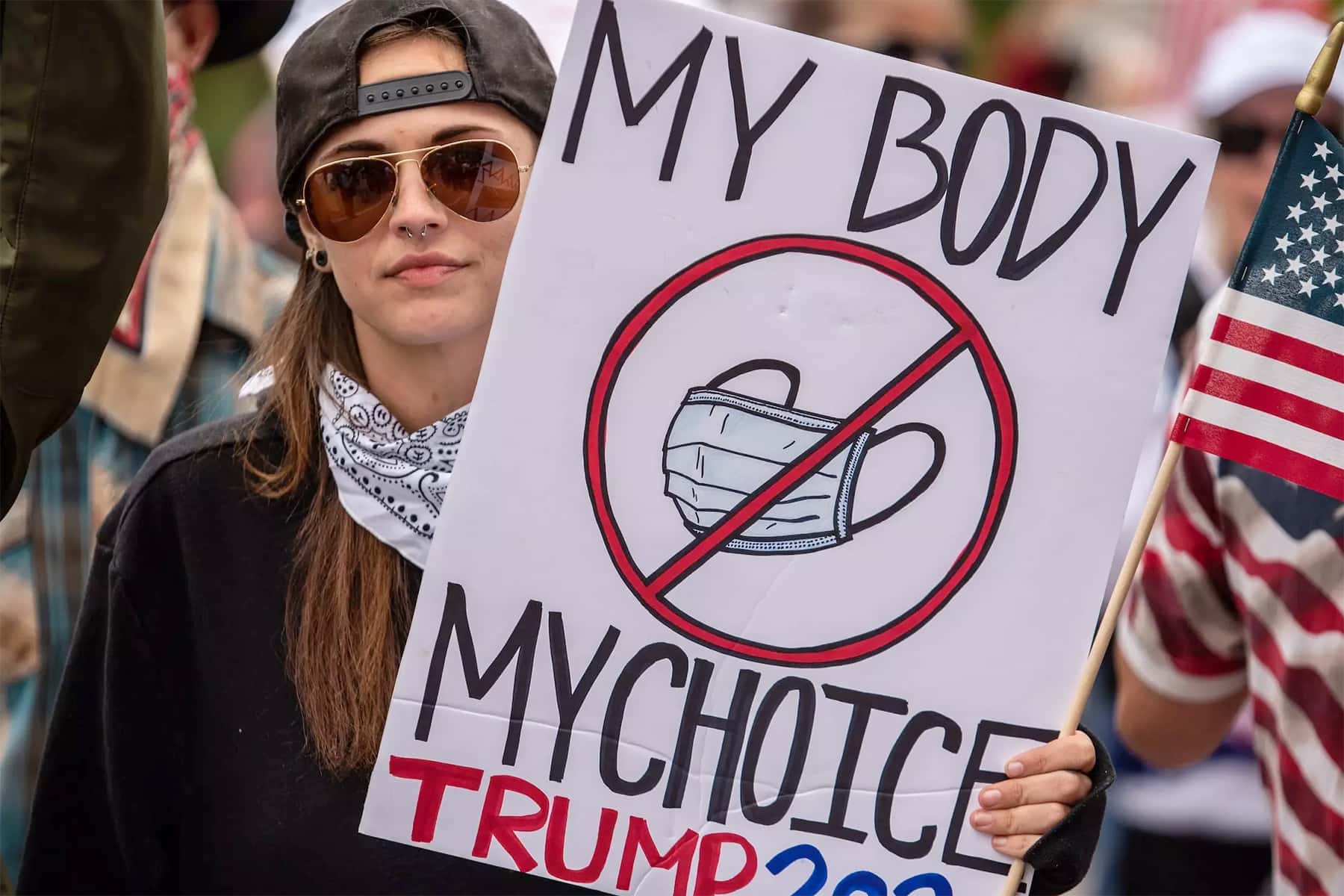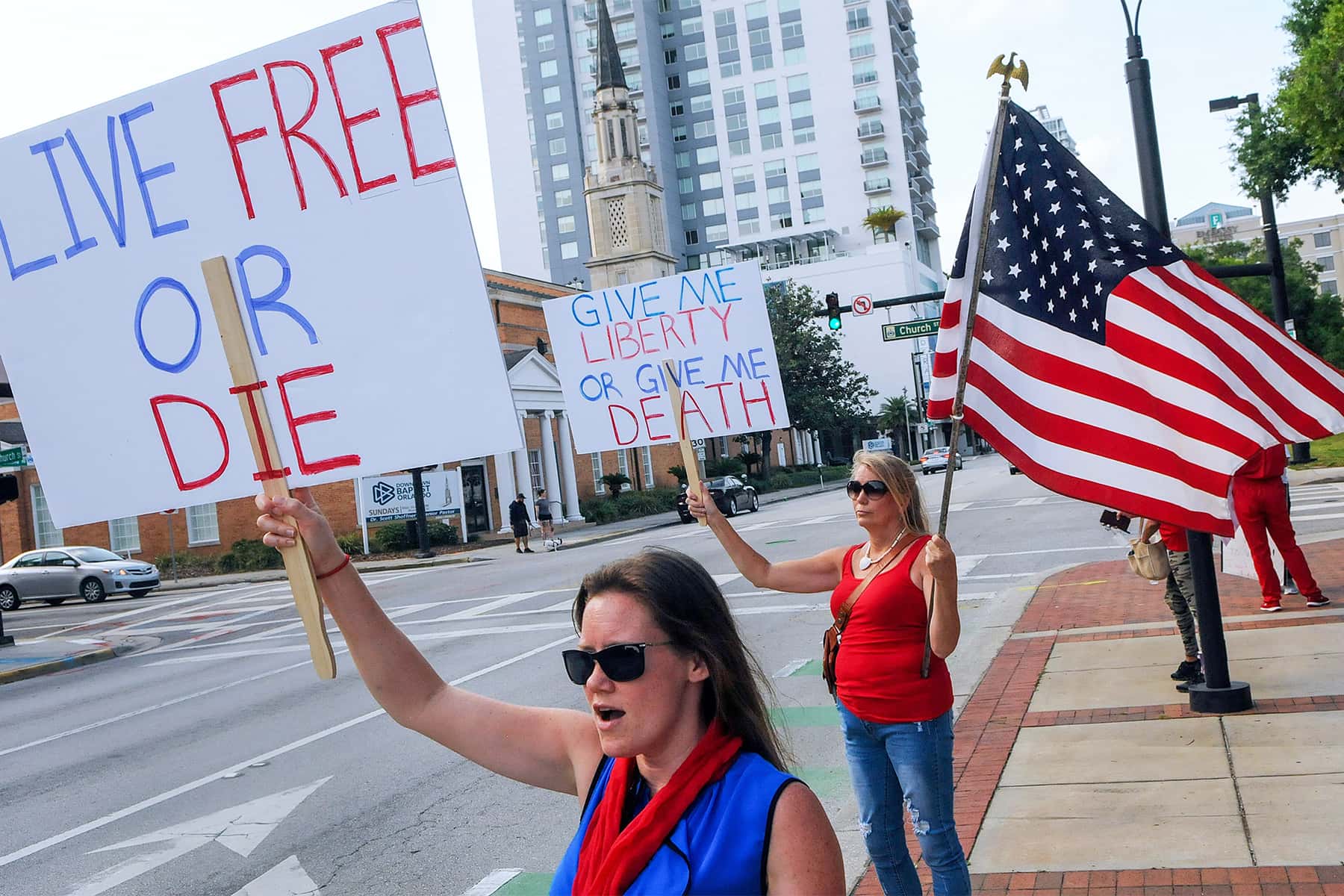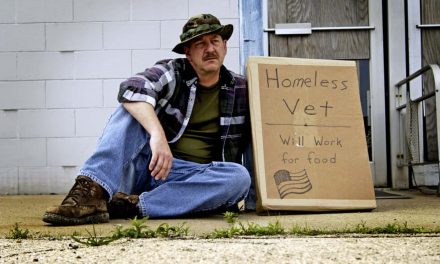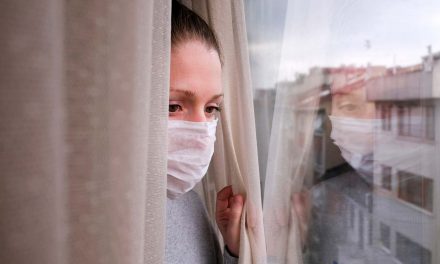
“Is life so dear, or peace so sweet, as to be purchased at the price of chains and slavery? Forbid it, Almighty God! I know not what course others may take; but as for me, give me liberty or give me death!” – Patrick Henry March 23, 1775
“Governor Brown has no authority to take our civil liberties. We aren’t going to wear masks. “F— Kate Brown.” – Oregon State Police trooper after refusing to wear mask inside Salem, Oregon coffee shop, July 2020
The cry by Patrick Henry of giving me liberty or giving me death is an American story we all learn about in school. Now we hear new calls about liberty as it relates to the wearing of masks during the current pandemic. In the earliest stages of the coronavirus pandemic, leaders waffled about the use and utility of wearing face masks. The messages about wearing masks were often conflicting and offered little in the way of comfort. Now people have spread anti-masks messages so much, that many are feeling pressure to not wear them.
People have been publicly shamed for wearing masks; several have been spat on for demanding people wear masks including a 7-Eleven employee in Forth Worth, Texas; security guard Calvin Munerlyn, a father of nine, was murdered for asking a customer to don a face mask at a Family Dollar in Flint, Michigan.
“We have a right in America not to wear a (expletive) mask.” – Customer at 7-Eleven in Forth Worth, Texas just before spitting on the cashier
“My co-worker was spat on by a person who wouldn’t wear a mask,” – Retail workeder in Riverside, California
On February 25, 2020 the first press briefing from our federal government about the novel coronavirus virus was held. Alex Azar, United States Secretary of Health and Human Services said, “Our advice remains as it has been that the average American does not need a N95 masks. These are really more for health care providers.” There was no further conversation during the press briefing about masks. At that time there had been a total of 15 confirmed cases in the U.S.
The following day, February 26, President Trump participated in his first coronavirus press briefing and a reporter asked, “Mr. President, should Americans be going out getting protective equipment such as masks, and so forth? And if so, what is the U.S. doing to boost production of masks?” He responded, “Well, we can get a lot of it. In fact, we’ve ordered a lot of it just in case we need it. We may not need it. You understand that, but in case we’re looking at worst case scenario, we’re going to be set very quickly, but I don’t think we’re going to ever be anywhere near that. I really don’t believe that we’re going to be anywhere near that. Our borders are very controlled. Our flights in from certain areas that we’re talking about are very controlled. I don’t think we’ll ever be anywhere near that.”
On February 27 the World Health Organization (WHO) held a press briefing about the virus. A reporter asked, “How concerned are you that masks may be in shortage, particularly in Europe?” Dr. Michael Ryan responded, “There is a shortage of supply of masks, but let’s separate the issue of the surgical masks that people want to wear in the street, from what our N95 or FFP2 or three respirator masks, which are needed within clinical care environments. We’ve been trying to protect those supplies.”
Later in the press conference another question was asked about masks. “I know that the mask could help prevent transmission from coughing and sneezing, and people all around China are called on to wear masks, from the premiere of the outbreak. But as this virus developed in Europe, it seems people still contesting that only those who are sick need to wear a mask. So, what is the common suggestion from WHO, concerning the stigmatization of wearing masks?”
Dr. Maria Van Kerkhove responded, “The WHO guidance is that we recommend people to wear masks if they themselves are sick, if they themselves have respiratory signs and symptoms. The reason for that is for them to prevent the transmission to someone else, not to protect themselves from getting infected. So, it can be confusing, but we try to make it very clear that you use a mask when you yourself are sick, and that we’re talking about a surgical mask…It’s very important that if we have shortages of masks, that we use them for the front line workers, and that we prioritize the use of those masks for the people who really need it in hospital, but also for those who are taking care of people at home.”
By late February the World Health Organization was saying the wearing of masks was a good idea but said they should be limited to those who are sick or those taking care of the sick only.
On the same day, California Gov. Gavin Newsome was asked about masks at a press briefing. “Do residents need to wear masks right now?” He answered, “No, I leave that to the doctors, but I’m not walking in here with any mask today. Dr Ghaley isn’t either.” Dr. Mark Ghaley, California Secretary of Health and Human Services followed up. “Yeah, we do not believe so. And as soon as that decision would change, we would share with the public widely.”
At that time in late February, we were already seeing conflicting information about the use of masks and differing opinions from WHO and U.S. leaders. Two days later, on February 29, at a White House briefing, Vice President Pence unequivocally said:
“Let me be very clear and I’m sure the physicians who are up here will reflect this as well. The average American does not need to go out and buy a mask.”
On March 2, 2020 during CDC testimony to the U.S. Senate, Dr. Anthony Fauci director of the National Institute of Allergy and Infectious Diseases, was asked this question by Senator Lamar Alexander. “Should we all be wearing masks?” Fauci replied, “No.” Alexander asked “Why?” Fauci responded, “Because right now there isn’t anything going around in the community, certainly not coronavirus, that is calling for the broad use of masks in the community.”
So in early March, the top infectious disease expert in the country was saying we don’t need to wear masks. There were 53 confirmed cases of COVID-19 in the country at that time.
Senator Mitt Romney during the same hearings asked, “Do masks help for the general public? Let’s say we have a major pandemic and people are concerned. They’re going to the grocery store. They know other people there might be infected. Do masks actually help? Do they prevent or reduce the likelihood of being exposed to the disease, Dr. Fauci?” Fauci answered, “It depends on the mask. If you look at the N95 masks, they are much better than those sort of floppy masks…The most important thing for a mask would be if someone is infected to prevent them from infecting others.”
On March 4, 2020 at a House Homeland Security Committee meeting, the question of masks came up again. Congresswoman Debbie Lesko asked, “Should people that don’t have a cold or aren’t coughing, should they wear face masks? I Googled it and it said, no, you shouldn’t wear a face mask unless you’re coughing. It won’t help. But then why is it that healthcare workers wear it? That’s my question to anyone.” Tom Inglesby, Director of the Center for Health Security of the Johns Hopkins Bloomberg School of Public Health responded with this. “The bottom line is that we don’t have evidence that face masks in public are going to do any good and we’re worried that if everyone goes out and buys a mask, that will diminish the number of masks that are available in the hospital where the people are the sickest and are transmitting at the highest levels.”
Julie Gerberding former director of the U.S. Centers for Disease Control and Prevention then followed that remark by saying, “Just to add one additional thing is that I’ve had to wear N95 respirators for many, many, many patient encounters and you can’t wear them for very long. They increase your work of breathing. They’re incredibly uncomfortable. So you go in the room, you do something, you take the mask off when you come out. To walk around with one of those on all day is impossible.”
Two of the top experts in the country were saying masks are unnecessary and/or uncomfortable in early March, even though multiple reporters and Congress persons were asking whether or not the public needed to wear them. Over the course of time, the messages about masks have been so confusing that some people across the country are fighting mad about having to wear masks in public places.
Kansas City, Missouri, Mayor Quinton Lucas after seeing a new surge of coronavirus cases in Missouri and in Kansas City received a death threat and multiple racist text messages after mandating the use of face coverings while in public.
“You should swing from a tree. I’m not threatening it, but would love to see it.” – Text message sent to Mayor Quinton Lucas, an African American
As is becoming increasingly clear to many, the wearing of masks in public is one of the few tools we have to prevent the spread of the coronavirus. The World Health Organization in the early stages of the pandemic were staunchly against the wearing of face masks other than by frontline workers and those sick with the coronavirus but they advocate the use of them worldwide now.
For many, this is a little late. There was clear evidence months ago that face coverings of some type helped. We knew from the 1918 flu pandemic that face coverings helped. This is not rocket science. People we depended on as experts and leaders were reluctant for months to tell us how face masks could help. Now as the pandemic has taken the life in recent days of an 11-year-old boy from Florida’s Miami-Dade County, the youngest person to die from Covid-19 in the state, we see a surge in cases among young people around the country.
Dr. Anthony Fauci talked about why we’ve seen surges much larger than in Europe in recent months. “When the European Union shut down… about 95 or more percent of the country truly locked down. When we were in our lockdown, about 50% of the country was in lockdown.”
Since states began reopening, the virus is running rampant in large cities and rural communities that had not been hit hard by the virus before. The United States confirmed 52,291 new coronavirus cases on July 2, according to Johns Hopkins University — the biggest one-day jump since the pandemic started according to CNN. That is an increase from just a few weeks ago when the numbers were 20,000 to 25,000 new cases per day.
As a result, dozens of states are rolling back their reopening plans. Wisconsin is not one of them. Nearly 20% of total COVID-19 cases in Wisconsin tested positive in the two weeks before the July 4th holiday, leading the state Department of Health services to issue the following statement. “The Department of Health Services urges Wisconsin residents to stay home and follow best public health practices during the upcoming Fourth of July weekend.”
Contact tracing data for the state indicated “that more and more individuals testing positive for COVID-19 have recently met up with people outside their household.” As many of those individuals refuse to wear masks case continue to climb. The state reports “6 of 7 regions in our state have high disease activity levels where the trend is increasing.”
In reversals from former remarks, Vice President Pence and President Trump, who both refused to wear masks in public, are now on the face masks bandwagon. Speaking to Fox Business Network on July 1, the President said: “I’m all for masks,” while repeating claims from months ago that the virus will magically “disappear”. He said in the same interview when asked if he thought the virus will disappear, “I do. I do. Yeah sure. At some point.”
Vice President Pence recently said, “If your local officials, in consultation with the state, are directing you to wear a mask, we encourage everyone to wear a mask in the affected areas. And where you can’t maintain social distancing, wearing a mask is just a good idea. And it will, we know, from experience, will slow the spread of the coronavirus.”
“Unfortunately, this simple, lifesaving practice has become part of a political debate that says: If you’re for Trump, you don’t wear a mask. If you’re against Trump, you do.” – Tennessee Republican Senator Lamar Alexander
The CDC, WHO and others are now telling us to wear masks after saying they were not necessary months ago, primarily because of early shortages of masks, not because they were not an effective tool to prevent the spread of the disease. Republican Senate Majority Leader Mitch McConnell said we should be wearing face masks, something that many of his GOP colleagues have disagreed with publicly for months.
“We must have no stigma, none, about wearing masks when we leave our homes and come near other people. Wearing simple face coverings is not about protecting ourselves, it is about protecting everyone we encounter.”
In Oregon, Governor Kate Brown has now required the state’s residents to wear face coverings in all indoor public spaces beginning July 1. “I do not want to have to close down businesses again like other states are now doing. If you want your local shops and restaurants to stay open, then wear a face covering when out in public” she said in a written statement. Rhode Island Gov. Gina Raimondo extended an order requiring face coverings until August 3. Jacksonville, Florida, announced it will be adopting a mandatory face mask requirement for public and indoor locations.
As the virus continues to surge around the country we must take heed of the importance of putting policies in place to protect us from ourselves. We can’t allow petty whining about the “inconvenience” of wearing masks to outweigh science and common sense. If we do, some people’s liberties will lead to some other people’s death. The virus is not done with us.
“This is not even close to being over. Although many countries have made some progress globally, the pandemic is actually speeding up. We’re all in this together and we’re all in this for the long haul. We have already lost so much, but we can not lose hope… This is a moment for all of us to reflect on the progress we have made and the lessons we have learned, and to recommit ourselves to doing everything we can to save lives. Six months ago, none of us could have imagined how our world – and our lives – would be thrown into turmoil by this new virus.” – Tedros Adhanom Ghebreyesus, World Health Organization Director-General
© Photo
Pаul Hеnnessy and Sеrgіо Flоrеs















